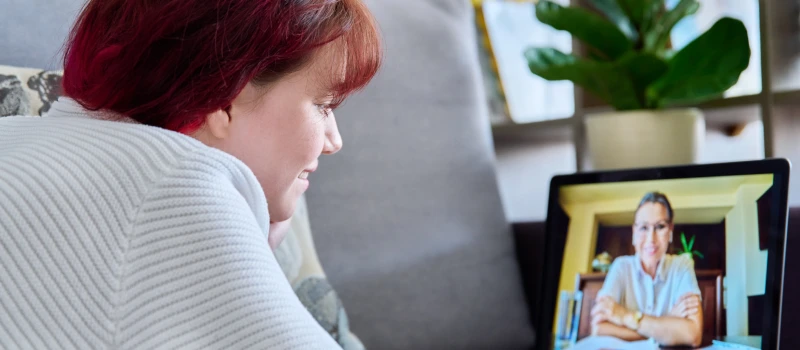
Table of Contents
5 Tips for Getting the Most out of a Teen Intensive Outpatient Program

Written By: Sarah duRivage-Jacobs

Clinically Reviewed By: Dr. Don Gasparini
Updated: January 23, 2024
5 min.
Just like any kind of mental healthcare, you’ll get out of a teen IOP what you put into it.
Learn more about our Clinical Review Process
Table of Contents
For many young people struggling with mental health challenges, going to therapy once a week isn’t enough. That’s where a teen or adolescent intensive outpatient program (IOP) comes into play (throughout this piece, we’ll use the term “teen IOP” or “adolescent IOP” to describe an IOP geared toward young people).
A teen IOP is a good option for those who need more intensive care but not 24/7 support. This includes young people dealing with serious mental health conditions, like mood disorders or co-occurring substance use disorders, and those returning from a partial hospitalization program or residential treatment. IOP treatment programs typically include multiple weekly group, family, and individual sessions. Between sessions, young people can practice skills they’re learning in the real world.
As the leading provider of virtual IOP for young people, the team at Charlie Health believes that anyone considering an IOP program deserves tips and recommendations to help them make the most of the program. Keep reading for our perspective on setting yourself up for the most effective IOP experience possible.

Get help now
Virtual, intensive outpatient programming for adolescents and young people.
5 tips for getting the most out of a teen intensive outpatient program
Just like any kind of mental healthcare, you’ll get out of a teen IOP what you put into it. Below are five tips to consider and prioritize as you try to make the most out of a teen or adolescent IOP.
1. Know what to expect
Knowing what to expect from a program helps you mentally and emotionally prepare for the process. It’s essential to know a program’s different components, potential benefits, and any challenging aspects you might come across. Here are some things to expect from teen IOP treatment:
Structured treatment options
As mentioned, a teen IOP provides clients a healthy balance of structure and flexibility. While the care plan itself will have structure—including scheduled sessions, separate therapeutic modalities, and expectations for both the clients and the clinicians—there’s tremendous flexibility.
Because IOPs are a form of outpatient treatment, they can be completed without taking time off from school, work, or social activities. Inpatient mental health treatment, by contrast, often requires people to take time off to live somewhere else and may require hospitalization. The intensive nature of the program, combined with the ability to continue daily life as usual, creates a unique and supportive environment for healing.
Individualized care
Mental healthcare is never one-size-fits-all, and neither are teen IOPs. Each individual’s path to healing will involve a different combination of therapeutic modalities and additional support to meet their unique needs and preferences and address their mental health condition.
Supportive environment
A teen IOP offers compassionate support from clinicians, social support from peers with similar challenges, and ongoing involvement of family members to create a supportive environment that’s conducive for sustainable healing. Virtual IOPs like Charlie Health may be especially helpful for clients who feel that their home is the safest and most supportive environment to address significant mental health challenges.
2. Keep showing up and be present
Whether a program is in-person or virtual (like at Charlie Health), showing up is the most important first step to getting the most out of an IOP. You can’t begin the process of healing without being present in your care plan.
Since IOPs are typically individualized for each person and incorporate different therapeutic modalities and approaches to care, every appointment or session matters. It’s like a therapeutic puzzle—each component supports you thoughtfully and holistically.
Also, any approach to therapy relies on building a therapeutic alliance between the therapist and the client. Showing up gives you more opportunities to build that trusting and compassionate relationship and experience its benefits in action.
3. Give recommendations a try
Some therapeutic modalities used in a teen IOP, like cognitive behavioral therapy (CBT), may involve activities between sessions. These activities, sometimes called homework, are created to deepen understanding of the skills and concepts that are covered in sessions and put them into practice. Like any new skill, new coping strategies take practice. Research shows that doing homework as part of a mental healthcare plan can even help improve therapy outcomes for young people.
4. Know that healing is rarely linear
All forms of healing take time—and they very rarely follow any sort of linear timeline or process, especially in terms of mental healthcare, data shows. Know that you’ll have ups, downs, twists, and turns along the way to feeling better. This is normal and expected. Be patient with yourself, show yourself compassion, and trust in the process.
5. Open yourself up to connection
When managing mental health challenges, social support has been clinically shown to be a significant part of healing and recovery. IOP’s outpatient treatment structure allows for access to intensive, high-quality mental healthcare in a supportive ecosystem of like-minded peers and family involvement.
Group sessions, which are a common component of IOPs, provide a structured environment for healthy connections to develop with other people who are dealing with similar issues. Leaning on your peers and supportive family members, both inside and outside of care, can also help you lovingly be held accountable and stay the course through all the ups and downs.
How does Charlie Health’s teen intensive outpatient program work?
Charlie Health’s IOP is completely virtual. We treat adolescents aged 11-17. Most people are in our treatment programs for 9 to 12 weeks, and each individual in our care receives a program personalized to their mental and behavioral health needs and preferences. In Charlie Health’s IOP, a typical schedule involves:
- 1 hour of individual therapy every week
- 1 to 2 hours of family therapy every week
- 3 hours of group sessions per day, held 3 days a week
- Psychiatric care as needed
Charlie Health treats many behavioral health and mental health conditions, including mood disorders, personality disorders, anxiety disorders, and substance abuse co-occurring with other mental health conditions. Our clinicians are skilled in various evidence-based treatment modalities, including cognitive behavioral therapy (CBT) and dialectical behavior therapy (DBT).

Getting started with Charlie Health’s IOP
If you’re a young person looking for a teen or adolescent intensive outpatient program (IOP), Charlie Health is here to help. Charlie Health’s virtual IOP provides more than once-weekly mental health treatment for people and families dealing with serious mental health conditions, including anxiety, depression, co-occurring substance use disorder, and more.
Our expert clinicians incorporate evidence-based therapies, like dialectical behavior therapy (DBT), into individual counseling, family therapy, and group sessions. With IOP treatment, managing your mental health is possible. Fill out the form below or give us a call to start healing today with intensive outpatient therapy.





